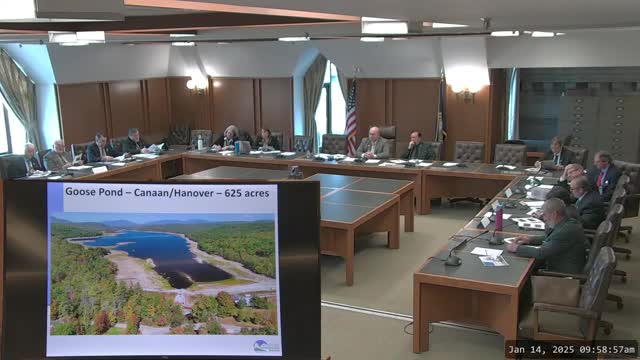DES outlines authority and testing plan for PFAS in air; Saint‑Gobain control permit, stack‑testing to follow
Get AI-powered insights, summaries, and transcripts
Subscribe
Summary
DES officials said Senate Bill 309 (2018) gave the department authority to control air emissions that contribute to groundwater or surface‑water PFAS contamination; DES issued a permit to Saint‑Gobain that required emissions controls and multi‑year testing and is preparing a state stack‑testing plan for bio‑waste and landfill gas devices.
Catherine (Kathy) Beam, administrator at the DES Air Resources Division, briefed the committee on DES authority and recent activity related to PFAS in air. She told the panel that Senate Bill 309 (2018) provided DES the specific authority to regulate air emissions that cause or “contribute to” PFAS violations in groundwater or surface water and authorized DES rulemaking in this area.
Saint‑Gobain and control permits. Beam said DES issued a permit to Saint‑Gobain Performance Plastics in Merrimack that required control technology and annual stack testing for three years; those tests demonstrated compliance while the facility was operating. The facility later closed; Beam said the closure removed an operating industrial source but did not end DES’s investigative or regulatory work in this field.
Emerging stack‑testing and devices of concern. Beam told lawmakers DES is developing a stack‑testing plan targeted at emerging devices and processes with PFAS‑bearing feed streams — for example, incinerators and technologies that treat soils, sludges, or biosolids, and also landfill gas, which recent research has identified as a potential PFAS precursor pathway. DES said it will use the testing plan to collect evidence that could prompt rulemaking for emissions controls on devices dealing with PFAS loads.
Monitoring, groundwater tie‑backs and policy. Beam noted DES has established ambient groundwater PFAS standards for the four regulated PFAS and has completed a plan to address surface water. She also said the department is conducting an annual literature and evidence review as required by a 2022 law amendment to the air toxics statute; that review has not yet changed DES’s conclusions on inhalation‑route risks for PFAS beyond the currently regulated fluorinated compounds.
Why it matters. PFAS are persistent, bioaccumulative chemicals of concern for drinking water and environmental contamination; DES officials told lawmakers the agency will continue to require emission controls where air sources are shown to contribute to water contamination and will move to further testing and possible rulemaking where new treatment or disposal technologies represent potential new sources.
Ending. DES asked the committee for patience while the agency completes statewide and regional testing and consultation with EPA and scientific partners; Beam said DES will return with further regulatory or rulemaking proposals if testing shows airborne pathways that require new emission standards.
